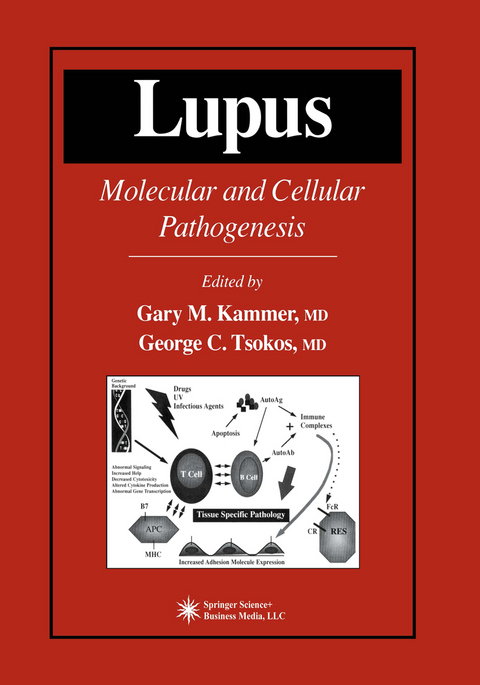
Lupus
Humana Press Inc. (Verlag)
978-0-89603-556-0 (ISBN)
Leading basic and clinical investigators from around the world summarize the most recent research on the molecular and cellular origins of lupus. Their cutting-edge articles review the mechanisms underlying abnormal immunity and introduce the powerful new concept that a disorder of multiple genes underlies the abnormal immune response, leading directly to the development of lupus. This pathophysiology is shown to involve a wide variety of cell types, including T cells, B cells, natural killer cells, macrophages/monocytes, and endothelial cells. Over time, the resulting long-term inflammation causes irreversible cell destruction and, ultimately, organ failure. Lupus: Molecular and Cellular Pathogenesis is a masterful new synthesis of all the new knowledge emerging today about lupus. Its new perspectives will sharpen the focus of research and ultimately lead to better and more effective treatment.
1 Lupus: The Clinical Entity.- 2 The Vascular Endothelium: A New Actor in The Pathogenesis of Vascular Injury in Systemic Lupus Erythematosus.- 3 Nitric Oxide in Systemic Lupus Erythematosus: Implications for Immunity and Inflammation.- 4 Molecular Mimicry, Altered Apoptosis, and Immunomodulation as Mechanisms of Viral Pathogenesis in Systemic Lupus Erythematosus.- 5 Clustering and Proteolytic Cleavage of Autoantigens in Surface Blebs of Apoptotic Cells: Implications for Pathogenesis of SLE.- 6 Immune Effects of Bacterial DNA and Their Possible Role in the Pathogenesis of Lupus.- 7 Genetics of Systemic Lupus Erythematosus.- 8 Genetic Insights into Murine Lupus.- 9 Murine Graft-vs-Host Disease: Relevance to Human Lupus Immunopathogenesis and Therapy.- 10 Lessons From Knockout and Transgenic Lupus-Prone Mice.- 11 B Cells in Systemic Lupus Erythematosus.- 12 Mechanisms of the Pathogenic Autoimmune Response in Lupus: From Mouse Models to Human Disease.- 13 T-Cell Autoimmunity in Lupus: Ignorance, Anergy, and Activation.- 14 T-, B-, and Natural Killer Cell Dysfunction in Murine Systemic Lupus Erythematosis Models.- 15 Mechanisms of T Helper Cell Activation and Function in Systemic Lupus Erythematosus.- 16 A Genetic Mechanism Underlying Deficient Type I Protein Kinase A Activity in Systemic Lupus Erythematosus T Lymphocytes.- 17 Impaired DNA Methylation in Lupus T Cells.- 18 Impaired Non—Antigen-Specific T-Cell Cytolytic Activity in SLE.- 19 Natural Killer Cells and CD8+ T Cells in the Downregulation of Antibody Production in Healthy Subjects and SLE: A Role for Transforming Growth Factor-? and Interleukin-2.- 20 Cytokines in the Immunopathogenesis of Lupus..- 21 Cytokine Gene Expression in Human Systemic Lupus Erythematosus.- 22 Balance Between Type 1 and Type 2Cytokine-Secreting Cells: Impact on Disease Activity in Systemic Lupus Erythematosus.- 23 Autoantibodies as a Source of Peptides That Regulate Autoantibody Production.- 24 Autoantibodies to Intracellular Antigens in Systemic Lupus Erythematosus Patients That Bind and Penetrate Cells.- 25 Pathogenesis of Autoantibody Production and Glomerulonephritis in Pristane-Treated Mice: An Inducible Model of SLE.- 26 Anti-DNA Antibodies: Markers of the Pathogenesis of Systemic Lupus Erythematosus.- 27 The Anti-DNA Response in Lupus: Structure, Initiation, and Pathogenesis.- 28 Glomerular Binding Antibodies in Systemic Lupus Erythematosus.- 29 The Antiphospholipid Syndrome: Mechanisms of Autoantibody-Mediated Thrombosis.- 30 Autoimmune-Associated Congenital Heart Block: Bringing Bedside Challenges to the Bench.- 31 Role of Calreticulin Autoimmunity in the Pathogenesis of Photosensitive Cutaneous Lupus Erythematosus.- 32 Complement System and Systemic Lupus Erythematosus.- 33 Type One Complement Receptor and Human SLE.- 34 Fc? Receptor Polymorphisms: Insights into Pathogenesis.- 35 Immune Complexes and Autoantibodies to C1q.- 36 Lipids and Lupus: The Fats of the Matter.- 37 Immunosuppressive Agents: Biologic Effects In Vivo and In Vitro.- 38 Treatment of Systemic Lupus Erythematosus by Selective Inhibition of T-Cell Function.- 39 Targeting Costimulatory and Other Signaling Molecules in Murine Lupus.- 40 Management of Murine Lupus by Correction of Fas and Fas Ligand—Induced Apoptosis: Therapeutic Rationale and Strategies.
| Erscheint lt. Verlag | 4.5.1999 |
|---|---|
| Reihe/Serie | Contemporary Immunology |
| Zusatzinfo | 38 Illustrations, black and white; XX, 709 p. 38 illus. |
| Verlagsort | Totowa, NJ |
| Sprache | englisch |
| Maße | 178 x 254 mm |
| Themenwelt | Medizinische Fachgebiete ► Chirurgie ► Unfallchirurgie / Orthopädie |
| Medizin / Pharmazie ► Medizinische Fachgebiete ► Dermatologie | |
| Studium ► Querschnittsbereiche ► Infektiologie / Immunologie | |
| ISBN-10 | 0-89603-556-5 / 0896035565 |
| ISBN-13 | 978-0-89603-556-0 / 9780896035560 |
| Zustand | Neuware |
| Haben Sie eine Frage zum Produkt? |
aus dem Bereich


